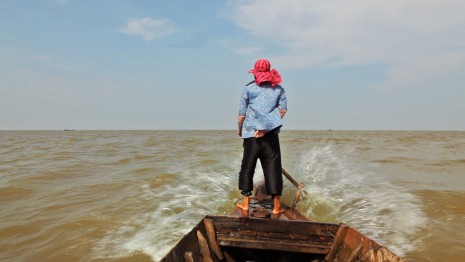A half-naked child totters into the frame carrying a bamboo basket. Securing her footing on the steep incline of a hill in Ratanakkiri province, she scrapes at the rust-red soil with her fingers in search of tubers.
The ochres and deep greens of Ratanakkiri’s forests are replaced by the dark blue of the Tonle Sap River in Kompong Cham province, where a teenage boy helps his father haul in the day’s paltry fish catch. Father and son return to their floating wooden home, lamenting the lack of fish.
Lastly, in Svay Rieng province, a single mother and her eldest daughter harvest rice, hacking the golden stalks with a steel scythe. Soon, the daughter must travel to work in a garment factory in Phnom Penh to help repay the family’s debts.
It was the burdens faced by each of the three children featured in the award-winning documentary “A River Changes Course,” that struck the film’s international audience the most, according to the director, Cambodian-American Kalyanee Mam.
The 83-minute film, which was made in collaboration with the Documentation Center of Cambodia, screened at the Sundance Film Festival in Utah last week and was awarded the World Cinema Grand Jury Prize for documentaries.
“They were shocked that children were holding knives and chopping at sugar cane and building fires and chopping fish and actually working to survive and provide for their families,” Ms. Mam said in an interview.
“In the industrialized world, children are almost protected too much. They are not given any responsibilities or given any duties,” she said. “But in Cambodia, the family is working in unison with each other.”
Such youngsters also do not get a chance at a real childhood, Ms. Mam said.
Sari Math, the teenage boy helping his fisherman father, says he could only study up to 7th grade before he had to quit to help support his family. It was for this same reason that Khieu Mok, the eldest sibling in her family of eight, had to find work in a garment factory far from home. Yet for all their sacrifices, Ms. Mam’s film makes it clear that the futures of these children and their families are etched in water and earth.
Over-fishing on the Tonle Sap has led to a decrease in the daily catch, and Sari Math is soon sent to a cassava plantation to work as a laborer for a private company. Deforestation leads Sav Samourn, the matriarch of the Ratanakkiri family, to worry about what her children will do once companies come and buy up her land.
“She and her family right now are able to use their land and work for themselves but the future generations will probably have to work as laborers for other people. And I think in that moment, all of us can relate to that,” Ms. Mam said.
“It’s not the same when we have to work for someone else, in a factory for example, where we have no control over our lives,” she said.
Explicit discussion of how the government is managing economic development is absent from the film, but the three stories—mostly shot with a hand-held camera to infuse the film with an intimacy and immediacy—illustrate the need for this conversation, Ms. Mam said.
While the lack of wider political context means that international audiences may be left somewhat in the dark regarding the country’s development path, the universal desire for the freedom to choose one’s future comes through in the poignant stories of the three children.
Khieu wants to be able to provide for her family while remaining close to them, Sari wants to continue his studies, and Samourn wants to be able to continue living off the forest.
“We are trying to move so fast that we’re not being thoughtful of the development process and what type of impact that development has,” said Ms. Mam, who left Cambodia as a young child and refugee in 1979 and grew up in Stockton, California.
With the World Cinema Grand Jury Prize, as well as the documentary’s recent acceptance into the San Francisco International Film Festival, which begins late April, Ms. Mam hopes that her success will bring more attention to Cambodia’s burgeoning film industry.
In one of the film’s rare sit-down interviews, set against a backdrop of expansive rice fields, Khieu Mok, who has returned to visit Svay Rieng, talks at length about how much she loves living in Phnom Penh despite the hard factory work and being away from her family.
The city is a whirlwind of color and noise, but Khieu relishes the freedom to leave her overcrowded dorm, walk down the street and peruse the delicious merchandise for sale at the markets.
“The best is if the factory can come here [to her village],” Khieu said. “If we had all the lights here, and all the roads here, we could go anywhere…that would be the best.”
With a single sustained shot of Khieu’s longing speech, Ms. Mam cuts through the complexities, economic and political, associated with Cambodia’s development, leaving only the love for family and a desire for a prosperous future to shine through.




